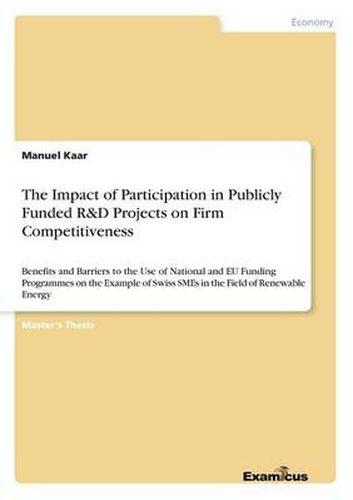Readings Newsletter
Become a Readings Member to make your shopping experience even easier.
Sign in or sign up for free!
You’re not far away from qualifying for FREE standard shipping within Australia
You’ve qualified for FREE standard shipping within Australia
The cart is loading…






This title is printed to order. This book may have been self-published. If so, we cannot guarantee the quality of the content. In the main most books will have gone through the editing process however some may not. We therefore suggest that you be aware of this before ordering this book. If in doubt check either the author or publisher’s details as we are unable to accept any returns unless they are faulty. Please contact us if you have any questions.
Master’s Thesis from the year 2011 in the subject Business economics - Investment and Finance, grade: 5.5, University of Applied Sciences Northwestern Switzerland, language: English, abstract: This thesis studies the involvement of small and medium-sized enterprises (SMEs) in publicly funded research and development (R&D) projects. SMEs represent 99% of all companies in Europe and are important drivers of innovation, yet many lack the necessary resources to engage in formal research activities. Providing these firms with the possibility to make use of public funding programmes for R&D projects therefore constitutes a way of stimulating them to innovate. Reviews of such programmes, however, show that SME participation is frequently lower than desired by policy makers. This raises the question of the benefits SMEs can gain from such projects and the barriers that negatively influence their ability to participate. The author hypothesises that taking part in publicly funded R&D projects can positively influence an SME’s competitiveness through a specific set of advantages gained from participation. The second hypothesis is that companies with previous experience in such projects evaluate their participation positively. Finally, the author puts forward that a number of specific barriers limit SMEs’ ability to participate. The hypotheses were tested by means of an online survey among Swiss SMEs in the field of renewable energy, as well as interviews with representatives of national and EU funding bodies. The results support all three hypotheses and confirm the importance of the public measures. Participation in publicly funded R&D projects can indeed have positive impacts on an SME’s competitiveness. Also, companies tend to evaluate their participation positively. SMEs with previous experience in such projects were well-informed about the specifics of a participation prior to filing an application, whereas a substantial lack of information exists on the pa
$9.00 standard shipping within Australia
FREE standard shipping within Australia for orders over $100.00
Express & International shipping calculated at checkout
This title is printed to order. This book may have been self-published. If so, we cannot guarantee the quality of the content. In the main most books will have gone through the editing process however some may not. We therefore suggest that you be aware of this before ordering this book. If in doubt check either the author or publisher’s details as we are unable to accept any returns unless they are faulty. Please contact us if you have any questions.
Master’s Thesis from the year 2011 in the subject Business economics - Investment and Finance, grade: 5.5, University of Applied Sciences Northwestern Switzerland, language: English, abstract: This thesis studies the involvement of small and medium-sized enterprises (SMEs) in publicly funded research and development (R&D) projects. SMEs represent 99% of all companies in Europe and are important drivers of innovation, yet many lack the necessary resources to engage in formal research activities. Providing these firms with the possibility to make use of public funding programmes for R&D projects therefore constitutes a way of stimulating them to innovate. Reviews of such programmes, however, show that SME participation is frequently lower than desired by policy makers. This raises the question of the benefits SMEs can gain from such projects and the barriers that negatively influence their ability to participate. The author hypothesises that taking part in publicly funded R&D projects can positively influence an SME’s competitiveness through a specific set of advantages gained from participation. The second hypothesis is that companies with previous experience in such projects evaluate their participation positively. Finally, the author puts forward that a number of specific barriers limit SMEs’ ability to participate. The hypotheses were tested by means of an online survey among Swiss SMEs in the field of renewable energy, as well as interviews with representatives of national and EU funding bodies. The results support all three hypotheses and confirm the importance of the public measures. Participation in publicly funded R&D projects can indeed have positive impacts on an SME’s competitiveness. Also, companies tend to evaluate their participation positively. SMEs with previous experience in such projects were well-informed about the specifics of a participation prior to filing an application, whereas a substantial lack of information exists on the pa